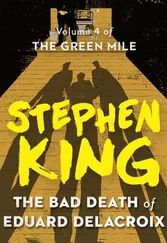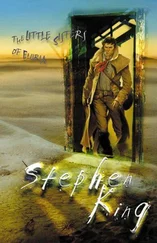Stephen King - The Plant
Здесь есть возможность читать онлайн «Stephen King - The Plant» весь текст электронной книги совершенно бесплатно (целиком полную версию без сокращений). В некоторых случаях можно слушать аудио, скачать через торрент в формате fb2 и присутствует краткое содержание. Жанр: Ужасы и Мистика, на английском языке. Описание произведения, (предисловие) а так же отзывы посетителей доступны на портале библиотеки ЛибКат.
- Название:The Plant
- Автор:
- Жанр:
- Год:неизвестен
- ISBN:нет данных
- Рейтинг книги:5 / 5. Голосов: 1
-
Избранное:Добавить в избранное
- Отзывы:
-
Ваша оценка:
- 100
- 1
- 2
- 3
- 4
- 5
The Plant: краткое содержание, описание и аннотация
Предлагаем к чтению аннотацию, описание, краткое содержание или предисловие (зависит от того, что написал сам автор книги «The Plant»). Если вы не нашли необходимую информацию о книге — напишите в комментариях, мы постараемся отыскать её.
The Plant — читать онлайн бесплатно полную книгу (весь текст) целиком
Ниже представлен текст книги, разбитый по страницам. Система сохранения места последней прочитанной страницы, позволяет с удобством читать онлайн бесплатно книгу «The Plant», без необходимости каждый раз заново искать на чём Вы остановились. Поставьте закладку, и сможете в любой момент перейти на страницу, на которой закончили чтение.
Интервал:
Закладка:
“Let her,” he said.
A tendril as thick as a branch detached itself from the nearly solid clump of green bulging through the doorway. It reached out to her, trembling, seeming almost to sniff its way to her. It slid around her wrist and she gasped. Herb started forward and Roger yanked him back. “Leave her alone! It's all right!” he said.
“Do you swear?”
Roger's lips were pressed together so tightly they were almost gone. “No,” he said in a small voice. “But I think.”
“It is all right,” Sandra said dreamily. She watched as the tendril slid delicately up her bare arm in a spiral of green and brown, seeming to caress her bare skin as it went. It looked like some exotic snake. “It says it's a friend.”
“That's what the Pilgrims told the Indians,” Bill said bleakly.
“It says it loves me,” she said, now sounding almost ecstatic. We watched as the tip of the moving tendril slipped under the short sleeve of her blouse. A small green leaf near the tip went under next, lifting the cloth a bit. It was like watching some new kind of Hindu fakir at work, a plant charmer instead of a snake charmer. “It says it loves all of us. And it says...” Another tendril snaked loosely around one of her knees, then slipped tenderly down her calf in a loose coil.
“It says one of us is missing,” Herb said. I looked around and saw that Herb's shoes had disappeared. He was standing ankle-deep in ivy.
Roger and I walked to the closet's doorway and stood there with the leaves brushing the fronts of our coats. I thought how easy it would be for that thing to grab us by the ties. A couple of long hard yanks and presto—a pair of editors strangled by their own cravats. Then several coils of ivy wrapped themselves around my wrists in loose bracelets, and all those paranoid, fearful thoughts dropped away.
Now, sitting at my apartment desk and pounding away at my old typewriter (also smoking like a furnace again, I'm sorry to say), I can't remember exactly what came next... except that it was warm and comforting and quite a bit more than pleasant. It was lovely, like a warm bath when your back aches, or chips of ice when your mouth is hot and your throat is sore.
What an outsider would have seen, I don't know. Probably not much, if Tina Barfield was telling the truth when she said no one could see it but us; probably just five slightly scruffy editors, four of them on the youngish side (and Herb, who's pushing fifty, would look young at a more respectable publisher's conference table, where the ages of most editors seem to range between sixty-five and dead), standing around the door of the janitor's closet.
What we saw was it. The plant. Zenith the common ivy. It had now expanded (and relaxed) all around us, feeling along the corridor with its tendrils and climbing the walls with its rhizomes, as eager and frisky as a colt let out of the stable on a warm May morning. It had both of Sandra's arms, it had my wrists, it had Bill and Herb by the feet. Roger had grown a loose green necklace, and didn't seem worried about it at all.
We saw it and we experienced it. The physical fact of it and the reassuring mental warmth of it. It experienced us in the same fashion, united us in a way that turned us into a small but perfect mental choir. And yes, I am saying exactly what I seem to be saying, that while we stood there in the grip of those many thin but tough tendrils, we shared a telepathic link. We saw into each others' hearts and minds. I don't know why I should find that so amazing after all the other stuff that's happened—the fact that yesterday I saw a dead man reading a newspaper, for instance—but I do.
Zenith had asked about Riddley. It seemed to have a special interest in the man who had taken it in, given it a place to grow, and enough water to allow it a fragile purchase on life. We assured it (him?) in our choir voice that Riddley was fine, Riddley was away but would be back soon. The plant seemed satisfied. The tendrils holding our arms and legs (not to mention Roger's neck) let go. Some dropped to the floor, some simply withdrew.
“Come on,” Roger said quietly. “Let's go.”
But for a moment we stood there, looking at it wonderingly. I thought of Tina Barfield telling us to just give it a DDT shower when we were done with it, when we'd gotten what we needed from it, and for a moment I was actually glad she was dead. Coldhearted bitch deserved to be dead, I thought. To talk about killing something that was so powerful and yet so obviously tame and friendly... profit-motive aside, that was just sick.
“All right,” Sandra said at last. “Come on, you guys.”
“I don't believe it,” Bill said. “I see it but I don't believe it.”
Except we knew he did. We'd seen it and felt it in his mind.
“What about the door?” Herb asked. “Open or closed?”
“Don't you dare close it,” Sandra said indignantly. “You'll cut off some of its little branches if you do.”
Herb stepped back from the door and looked at Bill. “Are you convinced, O Doubting Thomas?”
“You know I am,” Bill said. “Don't rub it in, okay?”
“Nobody is going to rub anything in,” Roger said brusquely. “We've got more important things to do. Now come on.”
He lead us back toward Editorial, smoothing his tie as he went and then tucking it into his belt. I paused just once, at the jog in the corridor, and looked back. I was convinced that it would be gone, that the whole thing had been some sort of wacky five-way hallucination, but it was still there, a green flood of leaves and a brownish tangle of limber vines, a good many now crawling up the wall.
“Amazing,” Herb breathed beside me.
“Yes,” I said.
“And all that stuff that happened in Rhode Island? All that's true?”
“It's all true,” I agreed.
“Come on,” Roger called. “We've got a lot to talk about.”
I started moving, but then Herb caught my arm. “I almost wish old Iron-Guts wasn't dead,” he said. “Can you imagine how something like this would blow his mind?”
I didn't respond to this, but I was thinking plenty, most of it having to do with Tina Barfield's note.
Back in Roger's office again, Roger behind his desk, me in the chair beside it, Sandra in her chair, Bill and Herb once more sitting on the carpet with their legs stretched out and their backs to the wall.
“Any questions?” Roger asked, and we all shook our heads. Someone reading this diary—someone outside of these events, in other words—would no doubt find that incredible: how in God's name could there be no questions? How could we have avoided spending at least the rest of the morning speculating about the invisible world? More likely the rest of the day?
The answer's simple: it was because of the mind-meld. We had come to a mutual understanding few people are able to manage. And there's also the small fact that we have a business to save—our meal-tickets, if you want to get down and dirty about it. Getting down and dirty seems easier for me since Ruth kissed me off—perhaps the prolixity will go next. I can hope, anyway. I'll tell you something about the fabled meal-ticket, since I'm on the subject. You worry when you're in danger of losing it, but you don't become truly frantic until you're in danger of losing it and you realize it could possibly be saved. If, that is, you move very quickly and don't stumble. Fatalism is a crutch. I never knew that before, but I do now.
And one more thing about the “no questions” thing. People can get used to anything—quadriplegia, hair loss, cancer, even finding out your beloved only daughter just joined the Hare Krishnas and is currently spare-changing business travelers at Stapleton International in a pair of fetching orange pajamas. We adapt. An invisible, telepathy-inducing ivy is just one more thing to get used to. We'll worry about the ramifications later, maybe. Right then we had a pair of books to work on: World's Sickest Jokes and The Devil's General.
Читать дальшеИнтервал:
Закладка:
Похожие книги на «The Plant»
Представляем Вашему вниманию похожие книги на «The Plant» списком для выбора. Мы отобрали схожую по названию и смыслу литературу в надежде предоставить читателям больше вариантов отыскать новые, интересные, ещё непрочитанные произведения.
Обсуждение, отзывы о книге «The Plant» и просто собственные мнения читателей. Оставьте ваши комментарии, напишите, что Вы думаете о произведении, его смысле или главных героях. Укажите что конкретно понравилось, а что нет, и почему Вы так считаете.












